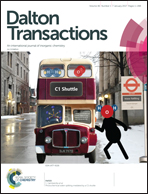Nanostructured discotic Pd(ii) metallomesogens as one-dimensional proton conductors†
Abstract
A novel family of square-planar Pd(II) complexes based on isoquinoline-functionalised pyrazolate ligands [Pd(pzR(n,n)iq)2] (R(n,n) = C6H3(OCnH2n+1)2, n = 4, 6, 8, 10, 12, 14, 16, 18) has been synthesised and characterised. The new complexes show mesomorphic properties and exhibit columnar mesophases that are highly-stable in exceptionally wide temperature ranges of up to 345 °C. The formation of nanochannels in the fluid liquid crystal phases generates continuous pathways for one-dimensional proton conduction on the basis of C–H⋯N proton transfer. The complex with an intermediate chain length (n = 12) shows the highest proton conductivity of 1.34 × 10−4 S m−1 at 269 °C in the hexagonal columnar mesophase, and an activation energy of 0.84 eV. The influence of both the terminal alkyl chain length and the mesophase columnar organisation on the proton conduction mechanism is demonstrated. The series of Pd(II) complexes investigated in this work constitutes one of the first examples of proton-conducting metallomesogens with potential applications in PEM fuel cells.



 Please wait while we load your content...
Please wait while we load your content...